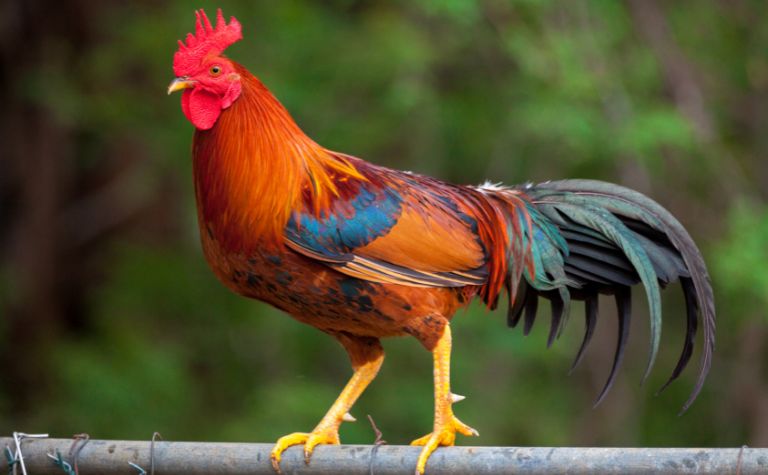The Bible teaches that God created animals. The Old and New Testaments mention many animals, such as bears, camels, donkeys, leopards, birds, fish, and ants. It also mentions dogs in several passages. However, only one verse in two related English translations refers to a specific breed of dog, and scholars have differing views about the Hebrew word’s true meaning.
The KJV and NKJV Bible translations mention the breed greyhound in the book of Proverbs. The Hebrew word behind the translation doesn’t explicitly refer to a dog. Instead, it’s a vague description of an animal, and scholars hypothesize (and debate) the particular animal it describes.
Who is Agur in the Bible? What does he have to do with greyhounds? Why do some Bible scholars believe the Hebrew word means greyhound while others think it refers to a rooster? What does the Bible say about dogs? Keep reading to learn the answers to these questions and others.
Also, see How Many Animals Were On Noah’s Ark? to learn more.

What is a confident animal with a slender waist that struts?
Solomon wrote most of the book of Proverbs. However, a wise man, a contemporary of Solomon named Agur, about whom the Bible says very little, wrote chapter 30.
In Proverbs 30:29-31, Agur mentions four animals to illustrate the principles of confidence and dignity. The writer compares their demeanor to someone who walks wisely, choosing righteousness and living for God.
Verse 31 lists the four animals. The King James Version (KJV) reads, “A greyhound; an he goat also; and a king, against whom there is no rising up.” The New King James Version (NKJV) also translates the Hebrew word as “greyhound.”
Most other modern versions of the Bible translate the word “strutting rooster,” including the NIV, NLT, ESV, NASB, and CSB. Why the difference?
The Hebrew word translated as greyhound
“Greyhound” is the KJV and NKJV translation of the Hebrew words zarzir mothnayim, which literally means “one girded in loins.” In other words, it’s different from the exact Hebrew word for greyhound or rooster.
Bible scholars know that the description refers to an animal like the other three creatures on the list, but its clear meaning is lost, so translators must hypothesize what it describes.
Strong’s Bible Dictionary elaborates on the Hebrew word: “From an unused root meaning to be slender; properly, the waist or small of the back; only in plural the loins.”
The classic Brown-Driver-Briggs Bible commentary adds that the word means “that which is girt in the loins, i.e., probably either a greyhound” or a war-horse.
For the possibility of other animals, see below.
Also, see What Is a Serpent in the Bible? to learn more.

Is a greyhound or rooster mentioned in Proverbs 30:31?
The Hebrew phrase translated greyhound and stuttering rooster refers to the animal’s waist, but that isn’t the only physical characteristic of the creature mentioned in the passage. Two verses before, in Proverbs 30:29, Augur describes how the animal walks.
The KJV reads, “There be three things which go well, yea, four are comely in going.” The NKJV says, “There are three things which are majestic in pace, Yes, four which are stately in walk.” Other English translations say “stately in their stride” (NIV), “tread” (ESV), or “march” (NASB).
In the opinions of some scholars, a strutting rooster fits this description better than a greyhound does. However, in the opinion of other scholars, the greyhound’s waist fits the Hebrew better, and its stride could be a reference to running ability.
The Septuagint, the Greek translation of the Old Testament completed a few hundred years before Jesus Christ, also translates the word as a rooster.
English scholars completed the translation of the King James Bible in the early 17th century, and publishers released the first edition in 1611. Greyhounds existed in England then, so translators had probably seen the animal’s body shape, including its small waist.
However, the dog breed wasn’t unique to England, as historians believe that it existed in Egypt thousands of years before Christ.
According to Proverbs commentator John Kitchen, the translation of rooster “is highly uncertain.” He adds, “Other possibilities offered include the war-horse, greyhound, starling, zebra, raven, and cockerel… This served as some nickname or watchword that signaled particular animals to the ancient readers, but which connection eludes us.” [1]
Also, see What Is Zion in the Bible? to learn more.

What does the Bible say about dogs?
The Bible refers to dogs in several passages, and most have them have negative connotations. Dogs were mainly seen as dirty scavengers though some were domesticated. For example, Job 30:1 reads, “But now they laugh at me, men who are younger than I, whose fathers I would have disdained to set with the dogs of my flock” (ESV).
Calling a person a dog was an insult
The most common way the Bible refers to dogs is by calling someone one as an insult.
- 1 Samuel 17:43, “And the Philistine said to David, ‘Am I a dog, that you come to me with sticks?’ And the Philistine cursed David by his gods.”
- 2 Kings 8:13, “And Hazael said, ‘What is your servant, who is but a dog, that he should do this great thing?’ Elisha answered, ‘The Lord has shown me that you are to be king over Syria.'”
- Matthew 15:26, “And he answered, ‘It is not right to take the children’s bread and throw it to the dogs.'”
Additionally, Paul referred to his opponents as dogs (Phil. 3:2; 2 Pet. 2:22; Rev. 22:15).
The behaviors of dogs are referenced negatively
Dog lovers in the Western world today embrace behaviors like going on walks, playing catch, and doing tricks. In contrast, the Bible refers to behaviors that most people find disgusting.
- Eating vomit: Proverbs 26:11, “Like a dog that returns to his vomit is a fool who repeats his folly.”
- Licking sores: Luke 16:21, “who desired to be fed with what fell from the rich man’s table. Moreover, even the dogs came and licked his sores.”
- Licking blood: 1 Kings 22:38, “And they washed the chariot by the pool of Samaria, and the dogs licked up his blood, and the prostitutes washed themselves in it, according to the word of the Lord that he had spoken.”
Also, see What Is Hyssop in the Bible? to learn more.
References:
[1] Proverbs by John A. Kitchen. A Mentor Commentary. p. 700.
Related Questions
According to Genesis 3, God placed Adam and Eve in the Garden of Eden to live and have fellowship with him and each other. But then the serpent appeared in paradise. It targeted the first couple,...
Noah's ark still fascinates Bible readers several millennia after its voyage because of its important purpose, enormous size, and the human and animal passengers it carried. Animals are a special...
